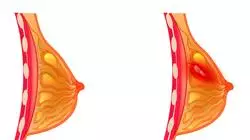University certificate
The world's largest faculty of nursing”
Introduction to the Program
An intensive Postgraduate certificate in Breastfeeding Physiology that will provide the nursing professional with the ability to intervene in this area with the certainty of having the best training in the subject"

Breastfeeding provides significantly better protection than artificial feeding against diarrheal diseases and respiratory infections in children, the main causes of mortality in low-income populations. In 1993, WHO estimated that 1.5 million infant deaths could be prevented each year through effective breastfeeding. In addition, formula milk is not only expensive, but can be a risk factor for malnutrition, as some mothers may be tempted to dilute it or switch prematurely to other forms of feeding. On the other hand, in some high-income countries many mothers stop breastfeeding earlier than they wish; although about 80% of mothers decide to breastfeed when they give birth, only 36% continue six months after delivery. Many mothers stop breastfeeding because they have a mistaken perception that their milk does not nourish their newborn, they lose confidence in themselves and that they are producing enough milk for their child to be properly nourished.
In the last three decades, the low incidence and duration of breastfeeding have been recognized as a public health problem.
The European Action Plan for the protection, promotion and support of breastfeeding recognizes breastfeeding as a public health priority. Society suffers from the detriments of non-breastfeeding, since artificial breastfeeding means an increase in health care costs due to the greater disease associated with non-breastfeeding; the mother has a greater risk of postpartum hemorrhage, spinal and hip fracture after menopause, rheumatoid arthritis, uterine, breast and ovarian cancer, hypertension, anxiety and depression. The increased disease of non-breastfed infants and their mothers leads to an increase in absenteeism from work, and companies are also suffering from these effects. Breastfed children cause less expenses to their families, to society in medicines and use of health services and cause fewer losses due to absenteeism from work, and we must not forget that it saves natural resources, does not pollute the environment and does not need to spend on manufacturing, packaging or transportation.
A Postgraduate certificate that will provide you with knowledge of the most innovative processes and support systems, endorsed by scientific evidence"
This Postgraduate certificate in Physiology of Breastfeeding for Nursing contains the most complete and up-to-date scientific program on the market. The most important features of the program include:
- The development of case studies presented by experts in Diseases and Breastfeeding
- The graphic, schematic, and eminently practical contents with which they are created provide scientific and practical information on the disciplines that are essential for professional practice
- New developments on Diseases and Breastfeeding
- Practical exercises where self-assessment can be used to improve learning
- Emphasis on innovative methodologies in Diseases and Breastfeeding
- Theoretical lessons, questions to the expert, debate forums on controversial topics, and individual reflection assignments
- Content that is accessible from any fixed or portable device with an Internet connection
This Postgraduate certificate may be the best investment you can make when choosing a refresher program for two reasons: in addition to updating your knowledge in Physiology of Breastfeeding for Nursing, you will obtain a certificate from TECH Global University"
It includes in its teaching staff professionals belonging to the field of Physiology of Breastfeeding for Nursing, who pour into this training the experience of their work, in addition to recognized specialists belonging to reference societies and prestigious universities.
The multimedia content developed with the latest educational technology will provide the professional with situated and contextual learning, i.e., a simulated environment that will provide an immersive training program to train in real situations.
The design of this program is based on Problem-Based Learning, by means of which the student must try to solve the different professional practice situations that arise throughout the program. For this, the student will be assisted by an innovative interactive video system developed by recognized experts in the field of Physiology of Breastfeeding for Nursing, and with extensive teaching experience.
With a complete and innovative audiovisual support that will make learning an interesting and stimulating experience"

The most complete update of the online teaching market in Physiology of Breastfeeding in a specific Postgraduate certificate for Nursing"
Why study at TECH?
TECH is the world’s largest online university. With an impressive catalog of more than 14,000 university programs available in 11 languages, it is positioned as a leader in employability, with a 99% job placement rate. In addition, it relies on an enormous faculty of more than 6,000 professors of the highest international renown.

Study at the world's largest online university and guarantee your professional success. The future starts at TECH”
The world’s best online university according to FORBES
The prestigious Forbes magazine, specialized in business and finance, has highlighted TECH as “the world's best online university” This is what they have recently stated in an article in their digital edition in which they echo the success story of this institution, “thanks to the academic offer it provides, the selection of its teaching staff, and an innovative learning method aimed at educating the professionals of the future”
A revolutionary study method, a cutting-edge faculty and a practical focus: the key to TECH's success.
The most complete study plans on the university scene
TECH offers the most complete study plans on the university scene, with syllabuses that cover fundamental concepts and, at the same time, the main scientific advances in their specific scientific areas. In addition, these programs are continuously being updated to guarantee students the academic vanguard and the most in-demand professional skills. In this way, the university's qualifications provide its graduates with a significant advantage to propel their careers to success.
TECH offers the most comprehensive and intensive study plans on the current university scene.
A world-class teaching staff
TECH's teaching staff is made up of more than 6,000 professors with the highest international recognition. Professors, researchers and top executives of multinational companies, including Isaiah Covington, performance coach of the Boston Celtics; Magda Romanska, principal investigator at Harvard MetaLAB; Ignacio Wistumba, chairman of the department of translational molecular pathology at MD Anderson Cancer Center; and D.W. Pine, creative director of TIME magazine, among others.
Internationally renowned experts, specialized in different branches of Health, Technology, Communication and Business, form part of the TECH faculty.
A unique learning method
TECH is the first university to use Relearning in all its programs. It is the best online learning methodology, accredited with international teaching quality certifications, provided by prestigious educational agencies. In addition, this disruptive educational model is complemented with the “Case Method”, thereby setting up a unique online teaching strategy. Innovative teaching resources are also implemented, including detailed videos, infographics and interactive summaries.
TECH combines Relearning and the Case Method in all its university programs to guarantee excellent theoretical and practical learning, studying whenever and wherever you want.
The world's largest online university
TECH is the world’s largest online university. We are the largest educational institution, with the best and widest online educational catalog, one hundred percent online and covering the vast majority of areas of knowledge. We offer a large selection of our own degrees and accredited online undergraduate and postgraduate degrees. In total, more than 14,000 university degrees, in eleven different languages, make us the largest educational largest in the world.
TECH has the world's most extensive catalog of academic and official programs, available in more than 11 languages.
Google Premier Partner
The American technology giant has awarded TECH the Google Google Premier Partner badge. This award, which is only available to 3% of the world's companies, highlights the efficient, flexible and tailored experience that this university provides to students. The recognition as a Google Premier Partner not only accredits the maximum rigor, performance and investment in TECH's digital infrastructures, but also places this university as one of the world's leading technology companies.
Google has positioned TECH in the top 3% of the world's most important technology companies by awarding it its Google Premier Partner badge.
The official online university of the NBA
TECH is the official online university of the NBA. Thanks to our agreement with the biggest league in basketball, we offer our students exclusive university programs, as well as a wide variety of educational resources focused on the business of the league and other areas of the sports industry. Each program is made up of a uniquely designed syllabus and features exceptional guest hosts: professionals with a distinguished sports background who will offer their expertise on the most relevant topics.
TECH has been selected by the NBA, the world's top basketball league, as its official online university.
The top-rated university by its students
Students have positioned TECH as the world's top-rated university on the main review websites, with a highest rating of 4.9 out of 5, obtained from more than 1,000 reviews. These results consolidate TECH as the benchmark university institution at an international level, reflecting the excellence and positive impact of its educational model.” reflecting the excellence and positive impact of its educational model.”
TECH is the world’s top-rated university by its students.
Leaders in employability
TECH has managed to become the leading university in employability. 99% of its students obtain jobs in the academic field they have studied, within one year of completing any of the university's programs. A similar number achieve immediate career enhancement. All this thanks to a study methodology that bases its effectiveness on the acquisition of practical skills, which are absolutely necessary for professional development.
99% of TECH graduates find a job within a year of completing their studies.
Postgraduate Certificate in Physiology of Breastfeeding for Nursing
Knowing the physiology of breastfeeding is the previous step to an adequate support intervention by the Nursing staff. A learning that requires updating in all the advances that have occurred in this area of work. In this Postgraduate Certificate we compile for you all these developments, in order to provide you with the most complete update in this regard. The Postgraduate Certificate in Breastfeeding Physiology for Nursing is an academic program designed to provide theoretical and practical knowledge about the importance of breastfeeding and the physiology behind it. This Postgraduate Certificate is intended for those Nursing students who wish to improve their skills in the care of breastfeeding mothers and newborns. In addition, it is also intended for those health professionals who wish to deepen their knowledge of breastfeeding and its impact on newborn health.
Take your career to another level with just an internet connection.
Through this program of study, students will have the opportunity to explore the main hormones involved in breastfeeding, as well as the anatomy and physiology of the breast. They will also learn about the processes of production, initiation and maintenance of breastfeeding, including the different types of breastfeeding and milk expression techniques. Upon completion of the Postgraduate Certificate in Breastfeeding Physiology for Nursing, students will gain a solid knowledge base about breastfeeding and its physiology, as well as practical skills that will enable them to support and assist breastfeeding mothers and their babies. At TECH we have the best faculty in the world who will take your career to another level. Enroll now and improve your skills in breastfeeding care and support!







